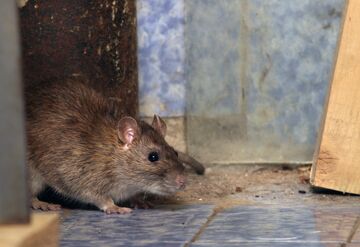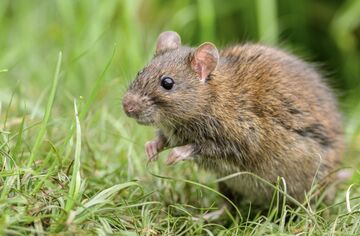How To Get Rid Of Rats
Rats are common pests in the UK. A rat infestation can quickly take hold if you do not address rat populations when they are in smaller numbers. A single rat can birth around six litters per year with 5-12 pups per litter. Once rats are established in your home or business, they can quickly cause extensive damage and even present a health hazard to the inhabitants.
What will attract rats to your home?
To help avoid a rat infestation, there are steps you can take to make your space less inviting for pests. Rats are commonly drawn to food scraps and places to shelter. Rubbish bins, bird feeders, pet food, pet waste and barbecue grills will often be the first reason that rats come close to your home.
If they can then gain access through small holes, or create holes, then you can expect them to stick around and breed. Once established, it can be difficult to remove rats from your property. Read on to learn how to spot the signs of a rat infestation and how to get rid of rats.

Common Signs of Rat Infestation
Learning how to spot the signs of a rat infestation is the first step to getting rid of rats. There are a few common tell tale signs that will indicate a rat problem in your home or garden. It's a common misconception that rats in the garden are less of a problem. If rats are able to multiply in your garden, then there is a good chance they will eventually venture inside during the colder months. Here are some of top signs that rats are in your home or garden.
Rodent droppings
Rat droppings are dark brown and tapered, often looking like large grains of rice. A rat can produce around 40 pellet shaped droppings per night, so they will be plentiful if you have a large rat infestation.
Nesting material
Rats like to burrow but will also shred up materials to make nests. This can include paper, lost insulation, cardboard and other other soft items they can get hold of. They can nest in lofts, attics, in eaves and even in your cavity walls.
Damage to food packaging
Rats will commonly seek out food sources and will damage food packaging to get to it. You might notice bite marks on your food packages, including things like pet food.
Rub marks
When rats establish a path, they will leave dark, greasy marks on walls and floors where they have passed through repeatedly. You might notice dark smudges and marks on skirting boards and floors.
Holes in walls and floors
Rats are capable of gnawing through wood, drywall, brick, concrete, aluminium and more. They will make holes in walls and floors to gain access to spaces there they can nest. You'll often hear them at night when they are the most active.
Footprints
Rats will leave small footprints and tail prints wherever they go. Look out for footprints in dirt outdoors and for dirty footprints indoors.

What happens if I don't get rid of rats?
Failing to get rid of rats will just allow them to continue multiplying. This can make a home uninhabitable after a certain amount of time, as the rats will leave droppings and also gain access to food, contaminating everything they touch along the way.
We know that rats carry diseases and need to be controlled in and around residential areas. Rats can also encourage other pests and vermin to multiply in an area, so taking steps to control rats in the garden and your home is essential.
How to get rid of rats
If you have confirmed you have rats in your garden in in your home, you need to take action quickly to avoid damage. The best option is to call in a professional pest control company to take care of your pest problem. However, there are steps you can take to help limit the spread of rats around your home.
Related Article: How Much Does Pest Control Cost
Remove food sources
Rats are drawn to food, so it's important to clean up messes and block access to food that might be stored in your kitchen or in your garden. For example, if you store animal food in garden buildings or a shed, consider placing this in a plastic container with a strong lid so the rats cannot gnaw through the bag. You could also bring it inside.
If you currently compost, this will be a great source of food for rats around your home. Rats eat waste from bins and compost heaps make this even easier. Instead of composting, you could use your green bin to get rid of food waste for a while until the rat problem is under control.
Bins and barbecues are also a good source of food for rats. Make sure your bins are inaccessible by making sure the lid is closed. You can also place a heavy item on top to prevent rats gaining access to your waste. And finally, make sure you clean and empty your grills after a barbecue to avoid leaving rotting food scraps for pests.
Another common source of food for rats is bird feeders. Try to avoid leaving out bird seed until you have got your pest problem under control. You could also use a rat-proof bird feeder to continue to feed garden birds without giving food to the rats.
Rat poison
Rat poison can help to control rats, but this isn't always the best option, particularly if you have rats in your home. While rat poison will help to eliminate rats quickly, there is the risk you could end up with a dead rat in a hard to reach area.
This could attract other animals and insects, while also leading to a very bad smell in your home. If you aren't sure if the rats have found entry points into your home, it's best to avoid killing rats with poison as you won't be able to control where they go to die.

Rat bait and traps
A far better choice for controlled garden rats is rat bait and snap traps. Rat infestations can be quickly brought under control by using traps to catch rats. Rat traps with rat bait are one of the most popular DIY pest control methods.
However, you will need to remember to empty the traps (if they are reusable) or throw them away. Snap traps, glue traps and humane traps such as CO2 traps are all excellent options that pest control services will likely use if they visit your home.
You will need to make sure the rat traps are placed in an area where non target animals cannot reach them, or you risk injuring animals like cats and dogs.
Natural predators to rats
Another common way to get rid of rats is to make the most of natural predators, including cats and dogs. Cats are natural rat repellents and will help to discourage rats from nesting near your home. Rats hate cats and dogs and will avoid nesting and feeding in areas where they are residing.
Keep shrubs trimmed
Another excellent way to control rat populations is by making it difficult for them to easily hide. Keep your gardens neat and tidy and keep shrubs and hedges trimmed back to help deter rats from nesting near your home. A neat and tidy garden will help to repel rats as they have poor eyesight and need to remain concealed.
For more information on how to get rid of pests, why not look through our guide on how to get rid of wasps.